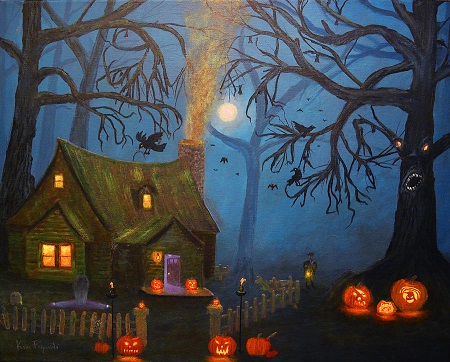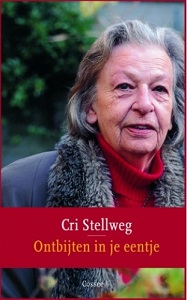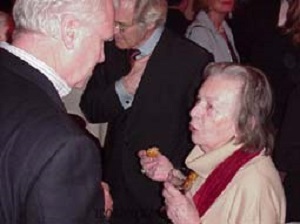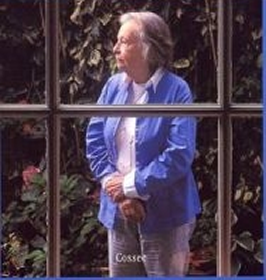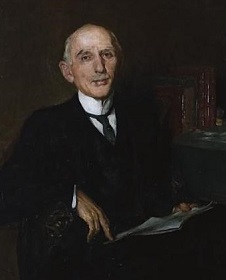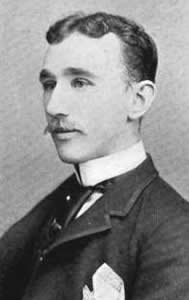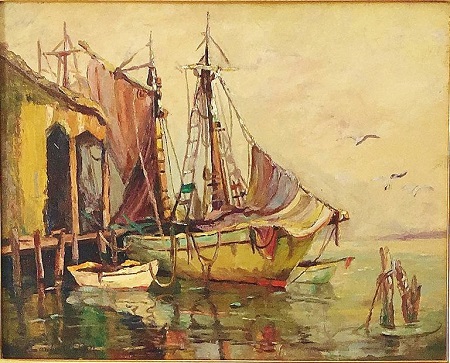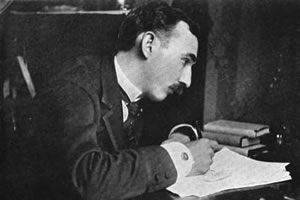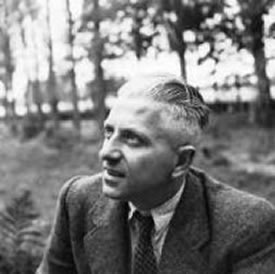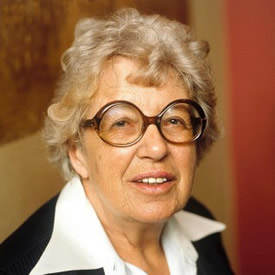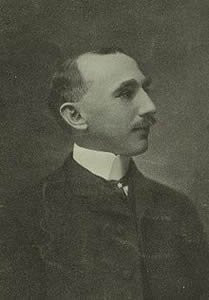De Nederlandse schrijfster en columniste Margaretha Hendrika (Cri) Stellweg (alias Saartje Burgerhart) werd geboren in Nijmegen op 23 maart 1922. Zie ook alle tags voor Cri Stellweg op dit blog en ook mijn blog van 27 november 2006.
Uit: Ik maak je een graf van letters
“En ik: ‘Ik denk eraan hoe vaak ik je in de weer heb gezien met die voeten van je.’
De onderhoudswerkzaamheden. Hij trok dan het been op tot de kuit te rusten kwam tegen de binnenkant van de dij en met zijn hoofd ter hoogte van de knie werd er geknipt en gevijld, met een klein tangetje werden losse velletjes weggetrokken, de nagelriemen teruggeduwd, met de vingertoppen de bal van de voet, de zool, tenen en wreef afgetast op onregelmatigheden of oneffenheden. Mooie voeten en terdege onderhouden voeten. In badkamer of slaapkamer kwam het niet zelden voor dat wanneer ik tijdens een of andere bezigheid wat voorover leunde, ik die voet in mijn bilspleet voelde, althans van die voet de grote teen. Hetgeen nogal eens uitliep op voortgezet lichamelijk contact.
Ik heb daaraan denkend misschien wel geglimlacht, zittend aan het voeteneind van zijn bed, maar omdat hij daarop niet reageerde en zijn stem – ‘Wat is er te giechelen?’ – me niet daarop opmerkzaam maakte, weet ik zelf niet eens of ik glimlachte bij die gedachtenspinsels van me. De communicatie tussen ons was na al die jaren verbroken. Ik keek op van zijn voeten, om te zuchten of zoiets, toch in verwarring gebracht door die tot nu toe gezamenlijk gedeelde herinneringen die nu misschien weldra alleen de mijne zouden zijn.
Mijn herinneringen ja, die heel eigen herinneringen van mij aan zijn voeten.
We waren onderweg naar een kampeerterrein aan de Dordogne. De kinderen waren klein. We waren te laat van huis vertrokken. De schemer overviel ons min of meer, Noord-Frankrijk was nog maar net bereikt. Hij besloot dat we maar een stop moesten maken voor de nacht, zomaar terzijde van de weg die loopt van Etain naar Verdun. De kleine groene legertent werd opgezet, vierpersoons maar met een beetje duwen en goeie wil pasten we er met ons vijven wel in. Maar de auto, ojee, de auto met alles eraan en erin voor drie weken kamperen, die moest daar in de berm blijven staan.”
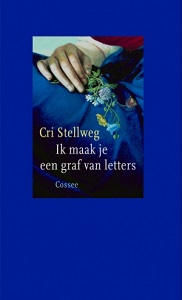
Cri Stellweg (23 maart 1922 – 26 november 2006)
Cover
De Amerikaanse schrijver en acteur Jonathan Ames werd geboren op 23 maart 1964 in New York. Zie ook alle tags voor Jonathan Ames op dit blog.
Uit: You Were Never Really Here
“Joe felt something behind him. It was the presence of life and the coming of violence, and that anticipation, that sensitivity, enabled him to turn in time and catch the blackjack on his shoulder, which was better than taking it on the back of his head. Also, it was his left shoulder and Joe was right-handed, and, turning around completely, he was able to grab the man’s wrist before the blackjack came down again, and they were face to face, the same height, and Joe immediately drove his forehead, like a brick, into the bridge of the man’s nose, shattering the bone, and the man, his eyes blinded by red pain, began to fall, and Joe brought up his knee, brought it up hard, without mercy, into the man’s jaw, breaking it. The man went down completely, strings cut, lifeless but breathing. Joe quickly swung his head to the left and the right. He was in an alley wide enough for a car. He’d come out of his flop hotel’s service entrance in the middle of the passageway, and no one was walking by or had stopped at either end. No one had seen. There was street light coming from the avenue, but the alley was mostly in shadow. Joe wiggled his left arm, trying to get life into it, the blackjack had numbed the whole limb, and he dragged the body behind a dumpster and quickly went through the pockets of the light coat, a blue windbreaker. The fallen was a pro. No wallet. No ID. Just keys and a money clip with about two hundred dollars. But there was a cell phone. So he wasn’t a total professional. He didn’t anticipate losing, and he didn’t anticipate being hunted, like Joe did. Joe never carried a cell phone. Joe looked at the blackjack. Police issue. Probably a bent cop from the Cincinnati suburbs doing a little moonlighting in the big town, where his face wasn’t known. Whoever had sent him didn’t want Joe dead. Not yet, anyway. They wanted to bring him in, talk to him. There was probably a partner waiting in a car, waiting for a call. Joe would have been spooked by a car in the alley, so this one had hidden in a cove of a doorway. He’d sap Joe and call his partner. They’d throw his body in the car and bring him to the boss. “
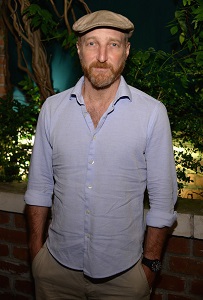
Jonathan Ames (New York, 23 maart 1964)
De Japanse dichteres en schrijfster Yōko Tawada werd geboren op 23 maart 1960 in Tokyo. Zie alle tags voor Yōko Tawada op dit blog.
Westerland or The Waste Land
Humane hormones
a pedestrian zone flowing
between bonehouses
Fish patties
Herring on a bun
Beach reads featuring perspiring bosoms
Ultraviolet the universal eye color
Your ebb and flow
synchronized with foam economics
A breeze shakes salt
in your face
Did you see
The cook is dead
lying beside his three arms
chopped off and thrown on the ground
an apron, wrinkly
as the North Sea, which he
dished up daily
a nourishing medley
The napkins are stained with rosehips and sky
A poorly-defined national flag
Not even the bedsheets with their dreamstains
can be washed clean amid these
faded scraps of order an expansion
or industrial milk teeth: pillars
without a roof
Aries
He said I was an animal with horns
dwelling eternally in the first seven years
of life. If I leave them,
I’ll perish. If I remain, I’ll never have
sex. My attempt to find a habitable age.
You have already found it.
An open landscape of hills, shut up
within the body of the camera.
There is no haiku about the interior
in which no seasons exist.
Vertaald door Susan Bernofsky
Yōko Tawada (Tokyo, 23 maart 1960)
De Amerikaanse dichter Gary Joseph Whitehead werd geboren op 23 maart 1965 in Pawtucket, Rhode Island. Zie alle tags voor Gary Whitehead op dit blog.
Plums
I like to slice them along the seam,
blade balanced on the fulcrum of pit
—that density, like bone, inside the flesh—
and roll until it’s cut clean through.
Then the twist as if uncapping a jar,
and I’m holding hemispheres:
the center of one an oval cup, the other
an egg I pluck from its sweet nest.
But always before I eat each smooth half
comes the urge to put it all back together.
Mouse In The House
For two nights now it’s wakened me from dreams
with a sound like paper being torn, reams
of it, a scratching that’s gone on for hours.
Blind in the dark, I think of my father’s
letters, the ones composed but never sent.
They were addressed to his sister, my aunt,
a woman I never met but whose voice,
slurry and calling from some noisy place,
introduced itself one New Year’s eve, late,
before my mother came and silenced it
with a click. She was one of many things
we never spoke of. But when the phone rang
at odd hours, I’d wonder if it was her.
That voice had resurrected the picture
in the silver frame, my parents’ wedding
day: on the church steps the woman throwing
rice, blond and beautiful, showing no trace
at all of malice in her youthful face.
Now the awful sound, waking me again
like a secret, calls to mind the poison
I left out, and my mother on their bed
tearing a box of letters into shreds.

Gary Whitehead (Pawtucket, 23 maart 1965)
De Amerikaanse schrijver Mitch Cullin werd geboren op 23 maart 1968 in Santa Fe, New Mexico. Zie alle tags voor Mitch Cullin op dit blog.
Uit: Mr Holmes
“Upon arriving from his travels abroad, he entered his stone-built farmhouse on a summer’s afternoon, leaving the luggage by the front door for his housekeeper to manage. lie then re-treated into the library, where he sat quietly, glad to be surrounded by his books and the familiarity of home. For almost two months, he had been away, traveling by military train across India, by Royal Navy ship to Australia, and then finally setting foot on the occupied shores of postwar Japan. Going and returning, the same interminable routes had been taken—usually in the company of rowdy enlisted men, few of whom acknowledged the elderly gentleman dining or sitting beside them (that slow-walking geriatric, searching his pock-ets for a match he’d never find, chewing relentlessly on an unlit Ja-maican cigar). Only on the rare occasions when an informed officer might announce his identity would the ruddy faces gaze with amaze-ment, assessing him in that moment: For while he used two canes, his body remained unbowed, and the passing of years hadn’t dimmed his keen gray eyes; his snow-white hair, thick and long, like his beard, was combed straight back in the English fashion. “Is that true? Are you really him?” “I am afraid I still hold that distinction.”
“You are Sherlock Holmes? No, I don’t believe it.” That is quite all right. I scarcely believe it myself.” But at last the journey was completed, though he found it diffi-cult to summon the specifics of his days abroad. Instead, the whole vacation—while filling him like a satisfying meal—felt unfath-omable in hindsight, punctuated here and there by brief remem-brances that soon became vague impressions and were invariably forgotten again. Even so, he had the immutable rooms of his farm-house, the rituals of his orderly country life, the reliability of his apiary—these things required no vast, let alone meager, amount of recall; they had simply become ingrained during his decades of iso-lation. Then there were the bees he tended: The world continued to change, as did he, but they persisted nonetheless. And after his eyes closed and his breaths resonated, it would be a bee that welcomed him home—a worker manifesting in his thoughts, finding him else-where, settling on his throat and stinging him. Of course, when stung by a bee on the throat, he knew it was best to drink salt and water to prevent serious consequences. Naturally, the stinger should be pulled from the skin beforehand, preferably seconds after the poison’s instantaneous release. In his forty-four years of beekeeping on the southern slope of the Sussex Downs—liv-ing between Seaford and Eastbourne, the closest village being the tiny Cuckmere Haven—he had received exactly 7,816 stings from worker bees (almost always on the hands or face, occasionally on the earlobes or the neck or the throat: the cause and subsequent effects of every single prick dutifully contemplated, and later recorded into one of the many notebook journals he kept in his attic study).”
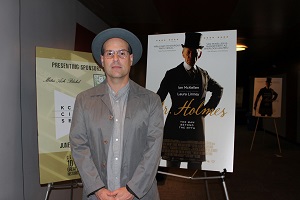
Mitch Cullin (Santa Fe, 23 maart 1968)
Cover
De Franse schrijver Roger Martin du Gard werd geboren op 23 maart 1881 in Neuilly. Zie alle tags voor Roger Martin du Gard op dit blog.
Uit: Les Thibault, I, Le pénitencier
— « Père, ce que j’ai vu là-bas… »
— « Assez là-dessus. Ton frère a pu te débiter tous les mensonges qu’il a voulus ; avec toi, il avait beau jeu ! Mais avec moi, ce sera une autre affaire. »
— « Jacques ne s’est plaint de rien. »
M. Thibault parut interloqué.
— « Eh bien, alors ? » lança-t-il.
— « Au contraire, et c’est le plus grave : il dit qu’il est tranquille, il dit même qu’il est heureux, qu’il se plaît là-bas ! » Et comme M. Thibault faisait entendre un petit rire satisfait, Antoine lâcha sur un ton blessant : « Le pauvre gosse a de tels souvenirs de la vie de famille, qu’il préfère encore sa prison ! »
L’offense manqua son but :
— « Eh bien, c’est parfait, nous sommes donc tous d’accord. Que veux-tu d’autre ? »
Antoine n’était plus assez certain d’obtenir la liberté de Jacques pour dévoiler à M. Thibault tout ce que les aveux de l’enfant lui avaient appris ; il résolut de s’en tenir à des griefs généraux et de dissimuler le reste.
— « Je vais te dire la vérité, père », commença-t-il, en fixant sur M. Thibault un regard attentif. « J’avais soupçonné des privations, des mauvais traitements, des cachots. Oui, je sais. Rien de tout cela n’est fondé, heureusement. Mais j’ai constaté dans l’existence de Jacques une misère morale cent fois pire. On te trompe quand on te dit que l’isolement lui fait du bien. Le remède est bien plus dangereux que le mal. Ses journées se passent dans une oisiveté pernicieuse. Son professeur, n’en parlons pas : la vérité est que Jacques ne fait rien, et il est visible que déjà son intelligence devient incapable du moindre effort. Prolonger l’épreuve, crois-moi, c’est compromettre à jamais l’avenir. Il est tombé dans un tel état d’indifférence, et sa faiblesse est telle, que s’il restait quelques mois encore dans cette torpeur, il serait trop tard pour lui rendre jamais la santé. »
Antoine ne quittait pas son père de l’œil ; il semblait peser de tout son regard sur cette face inerte pour en faire jaillir une lueur d’acquiescement. M. Thibault, ramassé sur lui-même, gardait une immobilité massive ; il faisait songer à ces pachydermes dont la puissance reste cachée tant qu’ils sont au repos ; de l’éléphant d’ailleurs, il avait les larges oreilles plates, et aussi, par éclairs, l’œil rusé. Le plaidoyer d’Antoine le rassurait. Il y avait eu déjà quelques embryons de scandales à la Fondation, quelques surveillants qu’il avait fallu congédier, sans ébruiter les [ I-208 ] motifs de leur renvoi, et M. Thibault avait craint un moment que les révélations d’Antoine fussent de cette nature : il respirait.”
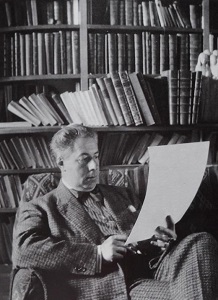
Roger Martin du Gard (23 maart 1881 – 22 augustus 1958)
De Amerikaanse dichter Madison Julius Cawein werd geboren in Louisville, Kentucky, op 23 maart 1865. Zie ook alle tags voor Madison Cawein op dit blog.
A Broken Rainbow On The Skies Of May
A Broken rainbow on the skies of May,
Touching the dripping roses and low clouds,
And in wet clouds its scattered glories lost:
So in the sorrow of her soul the ghost
Of one great love, of iridescent ray,
Spanning the roses dim of memory,
Against the tumult of life’s rushing crowds
A broken rainbow on the skies of May.
A flashing humming-bird among the flowers,
Deep-coloured blooms; its slender tongue and bill
Sucking the syrups and the calyxed myrrhs,
Till, being full of sweets, away it whirrs:
Such was his love that won her heart’s rich bowers
To give to him their all, their honied showers,
The bloom from which he drank his body’s fill
A flashing humming-bird among the flowers.
A moon, moth-white, that through long mists of fleece
Moves amber-girt into a bulk of black,
And, lost to vision, rims the black with froth:
A love that swept its moon, like some great moth,
Across the heaven of her soul’s young peace;
And, smoothly passing, in the clouds did cease
Of time, through which its burning light comes back
A moon, moth-white, that moves through mists of fleece.
A bolt of living thunder downward hurled,
Momental blazing from the piled-up storm,
That instants out the mountains and the ocean,
The towering crag, then blots the sight’s commotion:
Love, love that swiftly coming bared the world,
The deeps of life, ‘round which fate’s clouds are curled,
And, ceasing, left all night and black alarm
A bolt of living thunder downward hurled.
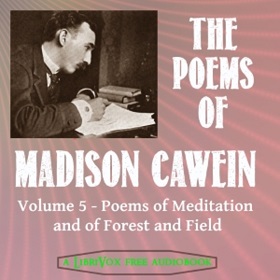
Madison Cawein (23 maart 1865 – 8 december 1914)
Cover
Zie voor nog meer schrijvers van de 23e maart ook mijn vorige blog van vandaag.

